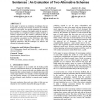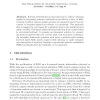499 search results - page 15 / 100 » Search Engines that Learn from Implicit Feedback |
WWW
2001
ACM
15 years 11 months ago
2001
ACM
We introduce a method for learning query transformations that improves the ability to retrieve answers to questions from an information retrieval system. During the training stage...
SIGIR
2002
ACM
14 years 10 months ago
2002
ACM
In this paper we present an evaluation of techniques that are designed to encourage web searchers to interact more with the results of a web search. Two specific techniques are ex...
104
Voted
ECCV
2002
Springer
16 years 29 days ago
2002
Springer
Abstract. This paper addresses the problem of probabilistically modeling 3D human motion for synthesis and tracking. Given the high dimensional nature of human motion, learning an ...
190
click to vote
AIEDAM
2011
14 years 6 months ago
2011
In familiar design domains, expert designers are able to quickly focus on “good designs”, based on constraints they have learned while exploring the design space. This ability ...
EDBT
2006
ACM
15 years 11 months ago
2006
ACM
Relevance Feedback is an important way to enhance retrieval quality by integrating relevance information provided by a user. In XML retrieval, feedback engines usually generate an ...


